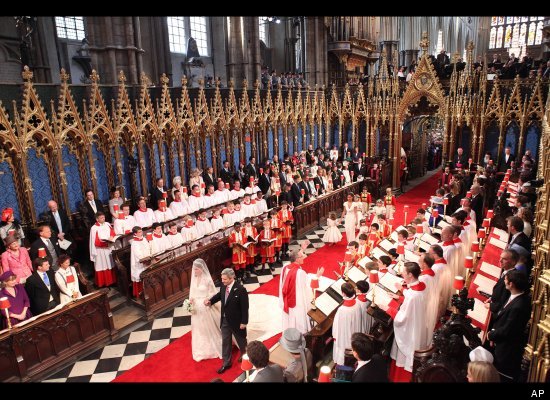Royal Liturgy
They say that almost half the people in the world watched the royal wedding? Why? William and Catherine aren’t that different from lots of other people who get married every day: not that much smarter, not that much richer, and not that much more influential. When George Bush’s daughter got married, who noticed? Why William and Catherine?
 May I suggest that the Anglican flare for liturgy had something to do with it? Presbyterians and Baptists, for two examples, don’t have copes and miters and ornate churches. Might I go further and suggest that people instinctively resonate to Anglican theology? Many American Protestants come from traditions that until fairly recently taught that marriage was a secular event and not to be held in churches. But the Prayer Book says:
May I suggest that the Anglican flare for liturgy had something to do with it? Presbyterians and Baptists, for two examples, don’t have copes and miters and ornate churches. Might I go further and suggest that people instinctively resonate to Anglican theology? Many American Protestants come from traditions that until fairly recently taught that marriage was a secular event and not to be held in churches. But the Prayer Book says:
“The bond and covenant of marriage was established by God in creation, and our Lord Jesus Christ adorned this manner of life by his presence and first miracle at a wedding in Cana of Galilee. It signifies to us the mystery of the union between Christ and his Church, and Holy Scripture commends it to be honored among all people.”
Don’t most people know deep down that that’s true? Marriage is not like buying a car or taking a job. It goes to the depths of what it means to be human and finds there an element of holiness that speaks of a divine purpose.
And if that’s true, shouldn’t we celebrate it with all the pomp and ceremony we can produce? Episcopalians have been doing this kind of thing for a long time not because we are “high church” or like a lot of ceremony but because we recognize the holiness of God in ordinary things and believe it should be celebrated. Human life needs ceremonial. We provide it!
 Christopher L. Webber
Christopher L. Webber
I was pleased to read your blogpost about this event, and I agree it warrants some pondering about why so many people tuned in and loved it.
I agree with you that it has something to do with the way that liturgy bespeaks and elevates human experience. I loved this: “It goes to the depths of what it means to be human and finds there an element of holiness that speaks of a divine purpose.” And this: “Episcopalians have been doing this kind of thing for a long time not because we are “high church” or like a lot of ceremony but because we recognize the holiness of God in ordinary things and believe it should be celebrated. Human life needs ceremonial. We provide it!”
But I cannot agree with your recitation (from the 1979 BCP liturgy) that “The bond and covenant of marriage was established by God in creation, and our Lord Jesus Christ adorned this manner of life by his presence and first miracle at a wedding in Cana of Galilee.” I don’t believe either that God established marriage in creation, nor that God blessed it at Cana. The first marvelous thing Jesus did was teaching in the synagogue at the age of about 12. By the BCP’s logic, shouldn’t we make it a sacrament when kids talk in church?
In this, I don’t mean to be argumentative. I think you have the overarching issue right. I just disagree with the BCP’s prologue to the marriage liturgy. And that’s my argument with the BCP theology, not your blogpost.
I really like this article and agree. Lloyd Patterson used to say, “He did not want to be a Mason, Elk or Moose. He preferred his liturgy in church.
RWC